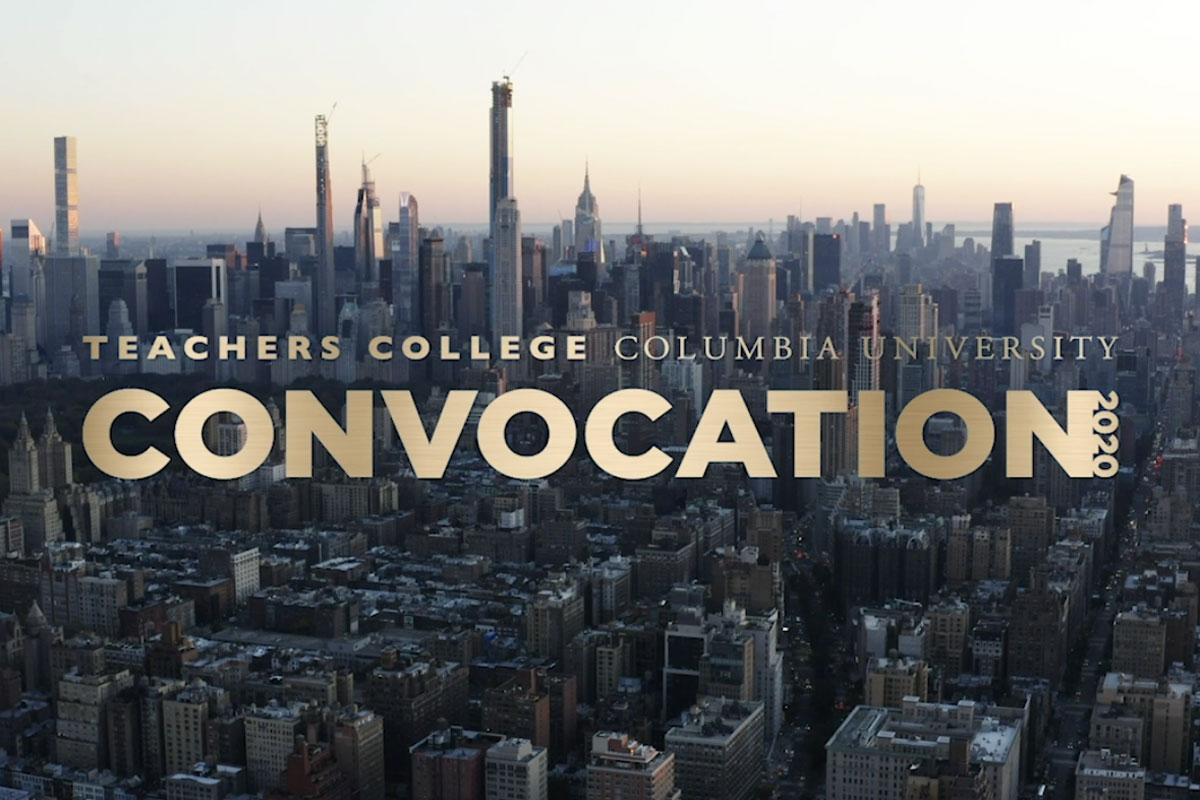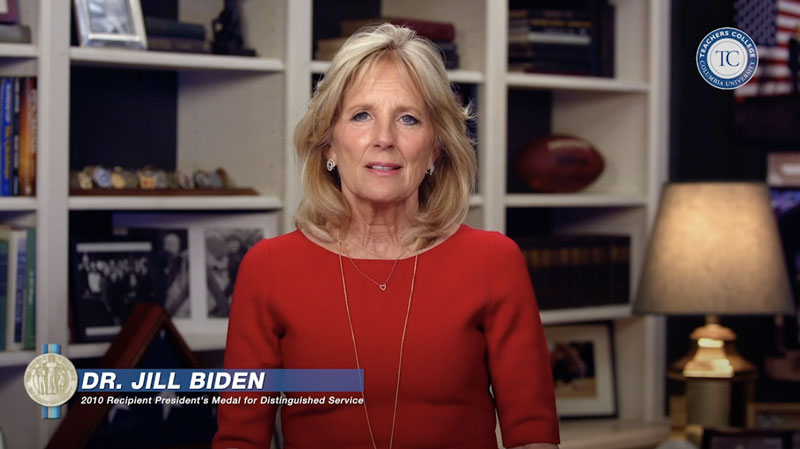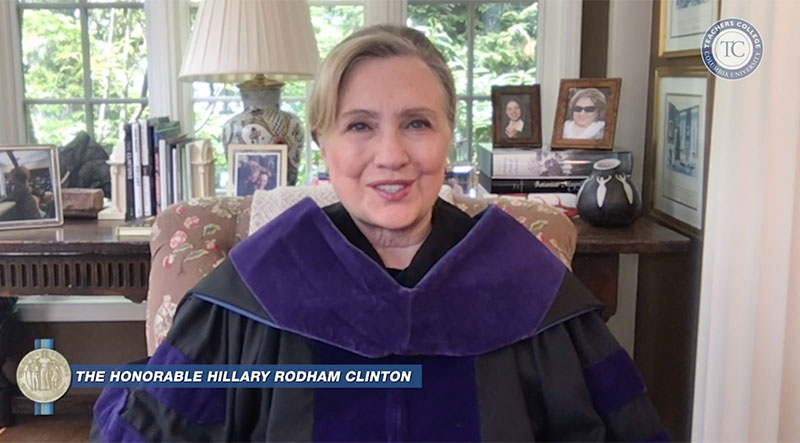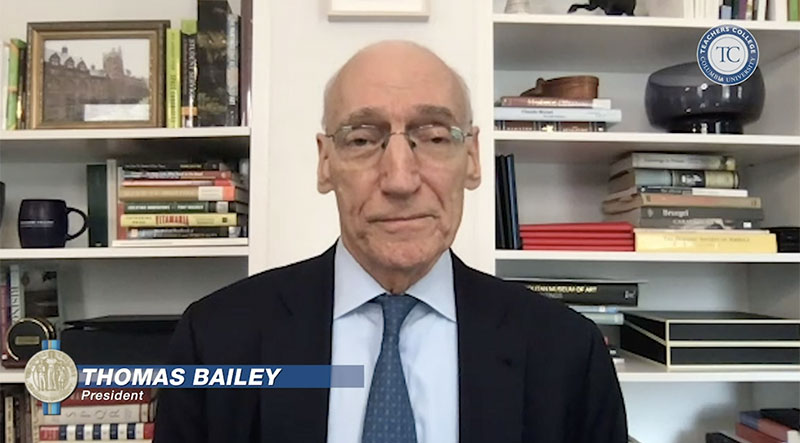Officially, the themes of TC’s first-ever virtual Convocation were the heroism of the graduates and the powerful sense of community that, in the midst of a crippling global pandemic, helped bring them to the finish line.
But the even more powerful message delivered by a group of speakers and well-wishers that included the Pulitzer Prize-winning New York Times journalist Nikole Hannah-Jones, former Secretary of State and Presidential candidate Hillary Clinton and former Second Lady Jill Biden, was that the longer struggle is just beginning, and the graduates’ skills and leadership are urgently — even desperately — needed.
Convocation 2020
“The importance of the moment could not be more clear,” Hannah-Jones, who has led the 1619 Project and was receiving TC’s Medal for Distinguished Service, told the more than 2,000 master’s degree and doctoral graduates and other viewers. “Millions of children, college students and educators across the country have found themselves, overnight, banished to a landscape of remote learning for which no community was prepared. You all have the opportunity to lead an education revolution that safeguards the best of public education and destroys the worst. So many of us who have worked in the area of educational inequity have long said that the system is so broken that the only way to fix it is to blow it up and start over. Well, the pandemic has taken that out of our control. In this tragedy lies a tremendous opportunity to reinvent public education in a way that lives up to its most democratic ideals.”
Biden, herself a long-time community college educator, also said that, from an educational standpoint, the current crisis is “the opportunity for a lifetime.”
“At this moment, teachers are more visible than ever as parents wrestle with home learning. Our creativity and grit have never been more needed. This pandemic has exposed the inequities, the challenges, and yet the opportunities of 21st century schools. Together we will rebuild and reimagine what our schools and classrooms could be if only we had the courage to bring them to life. And in that way, our voices have never been more powerful.”
Clinton spoke in more general terms, citing the African proverb — It takes a village to raise a child — with which she has become synonymous, and adding “that sentiment has been on my mind lately and not just because of my wonderful grandchildren.
“As we navigate the future, building a strong village is even more crucial,” Clinton said. “And it fills me with hope to think about all the teachers, scholars, school leaders, psychologists, health educators, economists, policy analysts, conflict resolution specialists, artists … really everyone who will play an essential role in making sure that we are not only rebuilding but building back stronger for our children.”
And in his opening remarks TC President Thomas Bailey succinctly framed the challenge facing TC's graduates: “The pandemic will likely bring about profound changes in our lives. The question is: Will the society that emerges be more equitable, or will it perpetuate all of the inequities, disparities and divisions that put everyone’s future at risk? Graduates, the answer is up to you. We need you now more than ever. We need you to illuminate the truth that we are all better off when we are all better off.”
The virtual ceremony itself reflected the duality of the historical moment, mirroring an awareness of the scars inflicted by the COVID pandemic — from the loss of loved ones to the canceling of on-campus classes and a live, in-person Convocation — while highlighting the ways in which the crisis has strengthened the TC community and elevated the mission of the College. Ultimately, virtual though it was, the hour-long event did justice to Provost & Dean Stephanie Rowley’s assertion that “Convocation is our ultimate celebration of the intricate and beautiful tapestry we know as Teachers College,” and that, as Board Chair William Rueckert put it, the founding vision of the institution created by his forebear, Grace Hoadley Dodge — a twin focus on how to teach and whom is being taught — “has never mattered more than today.”
The evening opened with a stunning video collage, created by the videographer Nel Shelby and narrated by TC faculty member Cally Waite, Associate Professor of History & Education, that began with the Manhattan skyline and then panned in on West 120th Street and its environs.
“Let’s talk about the Teachers College in our hearts and minds, which touches every corner of the world, every day,” Waite’s voice intoned. “What is TC? It’s the epicenter of education, health and psychology… but it’s also a coffee cart on West 120th Street. It’s a speeding number 1 train. It’s the early morning sunlight over Morningside Park — and, at this uncertain moment, it’s a way of being in a complicated world. Teachers College is the stuff dreams are made of.”
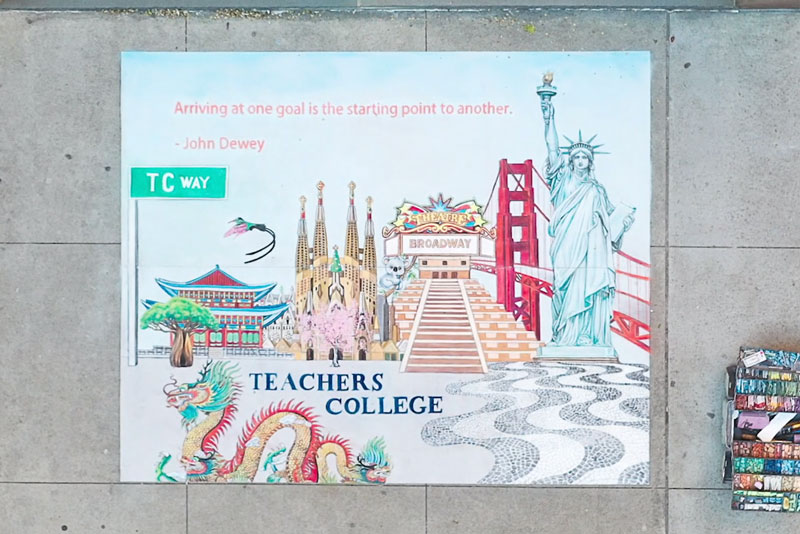
A tribute to TC by the sidewalk artist Hani (Photo: TC Archives)
Those images — interspersed with shots of the sidewalk artist Hani creating an elaborate chalk mural on the sidewalk in front of the College — soon gave way to China, India, Ecuador, Ghana and other theaters for TCs impact. Amid a stirring musical crescendo, Waite declared “Graduates, families and friends all around the world, welcome to TC’s 2020 virtual Convocation.”
Over the next 40 minutes, the graduates were lauded, thanked and encouraged by a cast of speakers that included not only Biden and Clinton, but the astrophysicist Neil de Grasse Tyson; New York Senators Charles Schumer and Kirsten Gillebrand, and New York City Council Speaker Corey Johnson; the award-winning author Jacqueline Woodson (Brown Girl Dreaming); and Columbia Journalism School professor Jelani Cobb (author of The Substance of Hope: Barack Obama and the Paradox of Progress). Biden, de Grasse Tyson, Woodson and Cobb have all spoken and been honored at past TC Convocation ceremonies.
[Click here to see a gallery of quotes from all speakers.]
The graduates also heard, in various ways, from several of their peers.
Student speaker Amann Syed Ahmad, receiving her master’s degree in Curriculum & Teaching, invoked the image of Ouroboros, the snake that swallows its own tail, which she said, “represents the cyclical nature of life.”
“During these perilous times, the Ouroboros is a reminder that for every ebb there is a flow,” said Ahmad, speaking from her home in Denmark. A teacher who was representing the Departments of Arts & Humanities, Curriculum & Teaching, and Mathematics, Science & Technology, Ahmad underscored the importance, at the present moment, of “striking a cosmic balance that goes beyond us as individuals to envelop us in families, communities and societies.”
Rachel Norman, receiving her master’s degree from the Department of Education Policy & Social Analysis (EPSA), spoke of her initial struggles at TC, when she worried that “the problems of the world are so great and nobody has solved them yet — so how could , of all people, make a difference?”
Norman, who was representing not only EPSA but the Departments of Biobehavioral Sciences, Counseling & Clinical Psychology and Health & Behavior Studies, said she ultimately found her footing through her work with a group of teen activists called Integrate NYC. Speaking from her apartment on 129th Street and Convent Avenue in Harlem, she called on her fellow graduates to “rest in community, resist with community and then rise as a community — because justice does not simply emerge. It must be envisioned and fought for.”
A third speaker, Woo Jung Amber Kim, who was receiving her master’s degree from the Department of International & Transcultural Studies (I&TS), told her peers that “our moment for celebration has been redefined by the global crisis.” Speaking from Seoul, South Korea, Kim, who represented I&TS, the Department of Human Development and the Department of Organization & Leadership, said that experiences such as her own field work last summer with indigenous teachers in Cambodia, appear all the richer in hindsight. “Through the crisis, our memories and accomplishments of our time at TC have been redefined for the better,” she said.

Natalie Fabian performs “What the World Needs Now is Love” (Photo: TC Archives)
Viewers were treated to a stunning home performance of “What the World Needs Now Is Love” by Natalie Fabian, a master’s degree graduate in Music & Music Education who has been performing regularly on TC’s “Come Together Right Now…Virtually” website since the beginning of the COVID crisis.
And still another student, Anderson Patrick Collin Smith, who was receiving his Ph.D. in English Education, read an original poem he had composed for Convocation, titled “What Matters Most.”
One powerful stanza particularly caught the spirit of the past few months for TC students:
So . . . we used technology to shorten the distance created by social distance;
From WhatsApp, Flipgrid, to Zoom.
Funny how life forces us to sit still so that we could finally hear the laughter in the room.
Now, do you see what matters? Like a thought trapped in a room, we pushed ourselves beyond extremes; we imagined a new reality and took hold of our dreams.
Encoded our visions, layered it with pride, foundation of love, we’re no longer trapped inside.
Time . . . truly a gift from the heavens I’d say. Now that the world sees us for what we are . . . we’re sane on this day.
[Click here to read the full text of Smith's poem.]
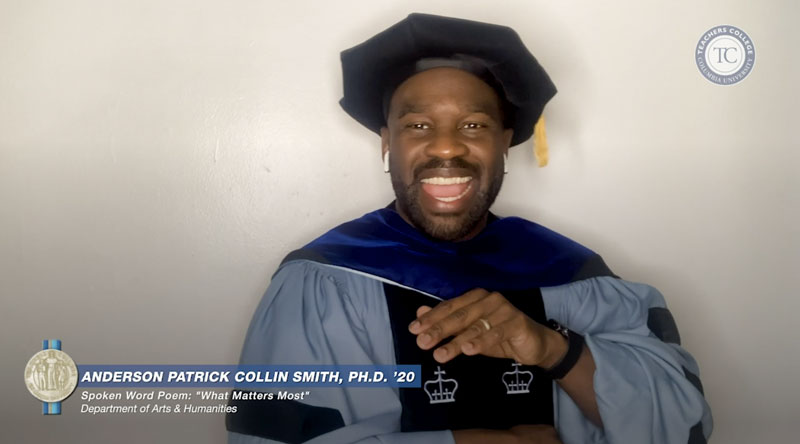
Anderson Patrick Collin Smith recites his original poem (Photo: TC Archives)
But in many ways, the most powerful moment of Convocation 2020 was its conclusion.
After calling the virtual ceremony a reaffirmation that “our physical campus and address is on West 120th Street, but our neighborhood spans the globe,” TC President Bailey hailed the College’s local partnerships in Harlem and on Morningside Heights.
“The spirit of friendship that has strengthened our ties with all of our neighbors over the years continues to sustain us now,” Bailey said. “So it is only right that we end this ceremony in that same spirit of friendship.”
With that, he introduced 50 members of the Manhattan School of Music Student Orchestra. In what Bailey called “a triumph of ingenuity and a reminder of how the whole can be more the sum of its individual parts,” the ensemble proceeded to play — each member shown, in a dazzling Zoom collage, in his or her own home — a selection from Beethoven’s third symphony, The Eroica, while the names of all the graduates scrolled down the screen.
One could not, as Bailey put it, “imagine a more fitting tribute to our graduates achievements and courage.”
[Read two more stories about Convocation: "And Speaking of Convocation: More from friends, luminaries and TC students" and "What Matters Most"]
